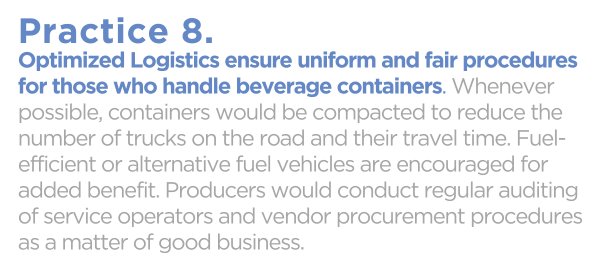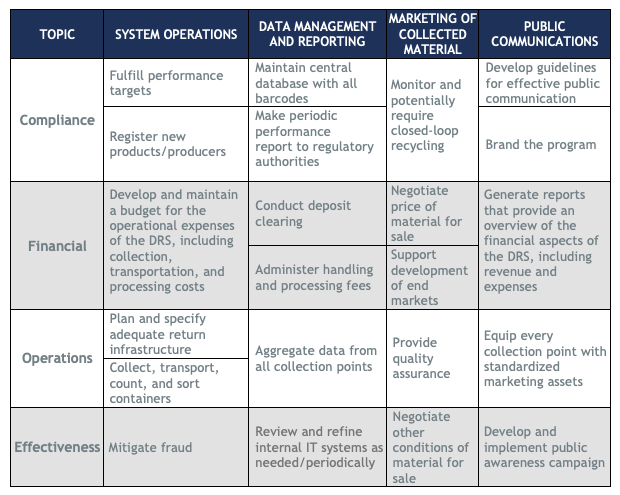The end is in sight!
Welcome to the 18th issue of Bottle Bill Common Ground — a limited-series newsletter from Reloop North America highlighting evidence-based guidance for policymakers, industry, and advocates working on bottle bills. (If you haven’t read our first 17 issues, you can do so here.)
We are now focused on 10 essential practices — requirements on how to build, run, and maintain a modern deposit return system (DRS) for beverage containers. The eighth essential practice is:

If you’ve reached issue 18, you’re well aware that running a successful DRS comes with a multitude of responsibilities spanning various aspects including financial management, operational compliance, and effectiveness parameters. When those responsibilities and their related parameters are clearly defined, the DRS works well. However, if left un- or ill-defined, the logistics of the system are compromised, leading to potential issues. System operators need to have the flexibility to manage DRS operations as they see fit, but this flexibility should always be balanced with the need to meet system performance and legal operational requirements. (Never forget Principle 8: Clear System Standards & Functions — the what and why of this super-important how).
When it comes to managing the logistical operations of the program, the system operator may choose to handle them directly or use contracted third-party service providers. It is in producers’ and public interest to prioritize logistical approaches that balance cost-effectiveness and climate-friendly operations. Strategies for optimizing logistics based on these parameters follow here.
DRS Operator Responsibilities
Optimizing the logistics of a DRS starts with a review of typical system operator responsibilities. These responsibilities fall into four distinct categories: system operations; data management and reporting; marketing of collected material; and public communications. Let’s explore the specific activities associated with each category:
 Optimizing Logistics – Factors to Consider
Optimizing Logistics – Factors to Consider
When deciding whether to manage activities internally or through external vendors, a DRS operator typically evaluates factors such as expertise, quality and cost-effectiveness. The following performance criteria for contracts have proven effective in ensuring optimized, consistent, and fair DRS operations:
- The service provider sets a minimum guaranteed collection schedule
- The service provider loads all the containers it is picking up
- Producers supply all necessary equipment to facilitate the smooth collection, and possibly emptying and sorting, of redeemable containers
- The contracting agent provides the establishment with a document outlining the operation of the collection service, the scope of redeemable containers, and the rules required to receive service
- Codified preference for service vendors that have implemented emissions-reducing operational procedures, e.g. reverse logistics and the use of alternative fuel vehicles
Case Study: Quebec
Quebec’s newly legislated DRS reforms, whose implementation will begin in 2023, include specific provisions regarding the selection of service providers. Namely, they require producers to consider the following aspects when choosing a service provider:
- Ability to meet transportation, sorting, and recycling requirements for containers
- Transparent business model with detailed impact on the community
- Reduction in greenhouse gas emissions in the collection and recycling processes, as well as their transportation routes and modes for transporting collected containers
While it is vitally important to set up a strong performance-based contract with service providers, it is equally critical for the operator or producers to regularly audit their service operators. This will not only ensure smooth and effective operations, but may potentially spare the operator or producers from reputational liabilities that could arise from inadequate service.
Managing a DRS is no small feat. No one can deny how complex it is for a system operator and their contracted service providers to carry out all of the operations. However, to achieve and maintain a high-performing DRS, corners must not be cut. Applying uniform and fair procedures, as well as clear performance requirements, will help deliver optimized contract logistics and quality assurances at every step of DRS operations.
Thanks for reading! We encourage you to share this newsletter widely with those who want or need to know about these principles and practices. Working together from a common ground of knowledge, we can move good bottle bills forward. Sign up here to get these blog posts as emails.
